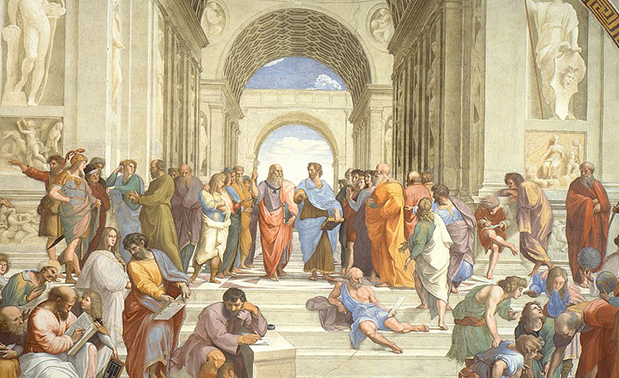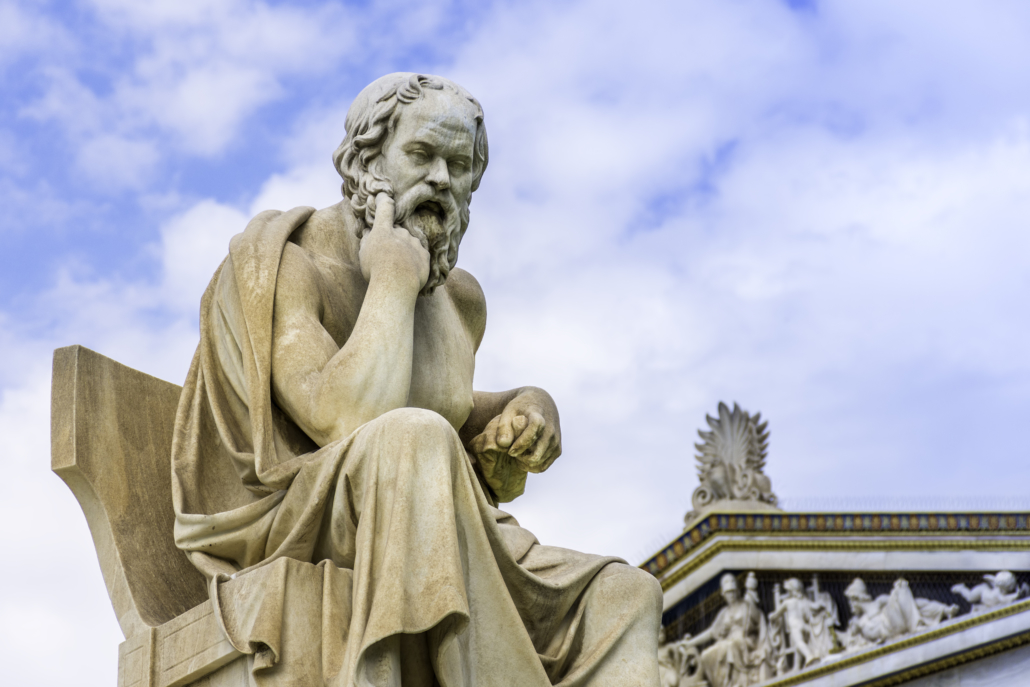The purpose of the Socrates@SaddleBrooke Club is to examine and discuss in the public square the Big Questions of life regarding our origin, destiny, and reason for being. We have been inspired by Socrates’s admonition that “the unexamined life is not worth living.” We evaluate the naturalistic evidence from modern science based on various philosophical and theological assumptions and follow the path of inquiry no matter where it may lead. We believe that God exists and that modern science and a Creator are completely compatible.
We host live Socrates Forums in a public setting where we present lectures that encourage audience Q&A, cross-examination, and discussion. We post videocasts of these events on the website and provide in-person and online opportunity to ask questions and engage further in dialog. We also post this information on social media platforms Facebook, You-Tube, and Linked-In.
The inspiration for this approach was given us by the philosophers of the “School of Athens” and the Judeo-Christian worldview which gave birth to modern science.
School of Athens
Athens, Greece. 4th century B.C.
Socrates and his prize students Plato and Aristotle are considered by many to be the fathers of Western philosophy. Socrates sought wisdom by humbly questioning everything and logically following the path of inquiry wherever it led. If evidence wasn’t there, or it wasn’t strong enough to reach a conclusion, he remained skeptical.
The School of Athens fresco in the Vatican by Raphael, 1509 A.D. The fresco represents the greatest philosophers, scientists and theologians from classical antiquity gathered together sharing their ideas and learning from each other. These figures all lived at different times but are here gathered together in artistic form under one roof.
At the center of the School of Athens fresco on the homepage we see Plato on the left and Aristotle hotly debating the foundations of inquiry.
Socrates, Plato and Aristotle
Their philosophy is foundational to the methodology of the club. Plato was Socrates’s student and Aristotle was Plato’s student. In the School of Athens fresco, Plato is pointing upward with a single finger stating that there is a higher, eternal, unifying and unchanging ultimate reality (Truth) that underlies the source of all knowledge. Aristotle with his fingers pointing downward, is arguing that reality is discerned more by understanding the material things we observe and experience with our senses.
Today this same discussion rages on: How do we account for the incredible diversity of all the material and immaterial things of the world and yet discover the unifying principle that lies behind them? At Socrates@SaddleBrooke we research answers to the Big Questions of life in our modern scientific age using this same socratic methodology alongside the scientific method and follow the path of inquiry wherever it may lead.
Judeo-Christian Worldview and the Birth of Modern Science
Whereas the School of Athens represents that truth is discovered through human reasoning, Paul represents that truth is given by God through revelation. Reason and revelation (natural and special) can work well together. They are not inherently adversarial. Western civilization and modern science are products of the agreements and inevitable tensions between the two.
Historians acknowledge that Aristotle was the first to give us scientific classification, but it was the Christian worldview that gave birth to our modern scientific methodology in the 17th century. With the invention of the telescope and new mathematics, Copernicus, Galileo, Kepler and Newton, along with many others, studied the heavens motivated by their conviction that because of their orderliness, comprehensibility and beauty, God must have created the heavens and the earth. And, they could understand the mind of God better by their investigation.
The Apostle Paul, the author of the majority of the New Testament, lectures to the Greek philosophers in Athens on Mars Hill (1st century A.D.), revealing to them that there is a Supreme Creator God – “in Him we live and move and have our being … for we are His offspring” (Acts 17:28).
Our Inspiration
Socrates
The formation of the Club was inspired by the man who discovered answers to Big Questions by asking Little Questions thus establishing a pathway to self-understanding. His “socratic method” is used throughout the world, not only in academia but in everyday situations where people with inquiring minds gather to learn and discuss.
Socrates Cafe groups were started in 1996 by Christopher Phillips who hosts small groups that meet in libraries, community centers, bookstores and coffee shops throughout the United States. There are over 30,000 participants thecafeproject.com.
Socrates in the City founded by Eric Metaxas hosts presentations several times a year in New York City and throughout the US socratesinthecity.com. His format is to interview major personalities in live audiences and stimulate on-going discussion afterwards.
The Oxford Socratic Club was a student society that met to debate the intellectual difficulties between academia and religion. It followed the practice of Socrates to “follow the argument wherever it led them.” C.S. Lewis presided as president 1942-54 during his years at Oxford.
Socrates@SaddleBrooke, LLC is an independent local educational club in SaddleBrooke, Arizona that hosts speakers who address the Big Questions of life followed by cross-examination and audience Q&A. We host live “Forums” and small group settings, as well as post video podcasts (videocasts) on the web.
Location of our Forums
DesertView Performing Arts Theater, SaddleBrooke, Arizona
Please look at your current email notification to confirm the time, location and program of the next live Forum. Make sure you are registered below to receive these emails.
What We Believe
We believe that truth exists and can be discovered by examining evidence from the natural world, reliable historical testimonies, and from God’s general and special revelation, then logically reasoning to a conclusion.
Truth
Truth is that explanation of a matter, if logically coherent and consistent, that best describes reality.
Worldview
Worldview is the set of cherished convictions and principles that we hold, whether we are conscious of them or not. It informs our starting assumption in evaluating new information and for reasoning to conclusions. Worldview is the “lens” through which we “view the world.”
Assumptions
At Socrates@SaddleBrooke we want to be aware of our worldview and its assumptions and be open to adjusting both based on new evidence that we may discover and any new conclusions we may draw.
Evidence
The basis for our investigation will be evidence-based inquiry from Nature and God’s Word regarding the truth of reality. Our working definition of evidence will be —
- Information presented in an attempt to demonstrate facts about reality.
- Conclusions that form the foundation of our belief.
- Data that improves our understanding of a matter and of each other.
Starting Point for Inquiry
The two debaters in the School of Athens fresco are Plato and Aristotle. They each begin their argument based on an unprovable assumption. Plato holds to a “top-down” assumption, represented by his one finger pointing upward, that there is a transcendent ultimate reality from which all other reasoning is based. Aristotle begins with a “bottom-up” assumption, that one discovers ultimate reality by evaluating the physical world around him (represented by his several fingers pointing downward) and knitting that evidence into a cohesive argument. At Socrates@SaddleBrooke we pursue both approaches of inquiry.
Evaluating Evidence
We evaluate evidence using standard definitions from science, law, and theology, that describe how well we are persuaded to arrive at a conclusion based on the data presented.
- Inference to the Best Explanation: We choose the explanation from among competing alternatives that best explains the available evidence.
- Preponderance of the Evidence: We choose the explanation that is more likely to be true than not true.
- Beyond Reasonable Doubt: There is convincing evidence to a level that accepts the explanation without hesitation, but without absolute certainty.
- Proof: There is sufficient evidence to demonstrate and establish the explanation as true, i.e., that which actually corresponds to reality.
- Faith: There is always a gap between a conclusion and absolute certainty (skepticism) that can be bridged only by trust (faith) that our reasoning actually matches reality.
Interpreting Evidence
Science, philosophy and theology attempt to understand the meaning of information by drawing out its correct interpretation from the data and evidence presented. In science and philosophy the data is about nature and the physical evidence and implications it presents. In theology, the data is the text of the Word of God and the ultimate reality it reveals. We attempt to draw inferences to the best explanations with both top-down and bottom-up argumentation.
Argumentation
The process of forming reasons and of drawing conclusions to the matter under discussion.
Full Disclosure
In the spirit of full disclosure, Stuart Orr, our host and author, is a committed Christian who believes that God is the Creator, Jesus Christ is the Son of God, Messiah, and Savior of the world, and the Bible is the Word of God. His personal conclusions and testimony can be found here. Even so, Stu does his best to relate the scientific evidence objectively and you are free to challenge his interpretation of the scientific data as well as his philosophical and theological assumptions and argumentation. That’s the purpose of the Club: for each of us to think deeply about things and enter into socratic discussions, as well as be open to our own assumptions and beliefs allowing challenge from opposing viewpoints. Most importantly, to come to conclusions for ourselves, even if only tentatively, while being respectful of other positions without having to agree with them.





